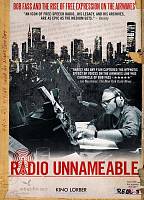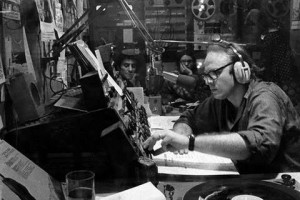RELEASE DATE: 9/10/13 | PRICE: DVD $29.95
BONUSES: archival clips, deleted scenes, archival audio, Jeffrey Lewis music video, “Night People” short, trailer
SPECS: NR | 87 min. | Documentary | 1:78:1 widescreen | stereo
The special magic that was (and is) late-night talk radio is beautifully conveyed in the documentary Radio Unnameable, a moving portrait of Bob Fass, an NYC radio legend who has been hosting a show on WBAI-FM for 50 years. Though it could’ve just been “another Sixties documentary,” the film explores the special bond Fass has had with his listeners over the years and also celebrates the fact that he does his show as a labor of love (he’s worked without a salary for the last three decades).
In recent weeks, the film has been on PBS throughout the country, but the DVD release contains several supplements that are “must-haves” for fans of Sixties pop culture. A menu selection called “archival audio” offers five vintage chunks of Fass’s radio show, called (no surprise) Radio Unnameable.
The shortest and most indelible clip finds Tiny Tim in the studio in 1969, singing and playing ukulele along with one of his favorite 78s. Another vintage slice finds Fass debating an angry teenage caller who is vehemently anti-drug.
His wry sense of humor is revealed in the drug debate and in a 1966 segment with Jose Feliciano, who steals the show without playing a single note of music, displaying a quick wit as he spoofs TV commercials and game shows.
The remaining two segments offer the best “101” to Fass’s show. The first is a sublime 1968 time capsule in which his guests are humorist/journalist Paul Krassner, poet/rocker Tuli Kupferberg, and Country Joe and the Fish. The other beautiful chunk of a “Radio Unnameable” broadcast is a 2007 interview with the inimitable Professor Irwin Corey (then 93 and vital, and still performing these days at 99!).
The video extras are equally impressive. They include raw, super-8 film of a nude 1967 in-studio “happening” (things were very different in the Sixties…) and great video of a wisecracking and very happy Abbie Hoffman guesting in 1988.
The pièce de résistance for those who love old-school “alternative media” is an extremely high-spirited Fass on the Manhattan cable access show The Coca Crystal Show on the night Clinton was first elected President. Both host and guest indulge in on-air hits from a bong made out of a shelled-out broccoli stalk (things were very different in the Nineties!) and speculate on Clinton’s win with callers.
These extras supplement a wonderful documentary movie about a man whose show has been a kind of “refuge” and way-station for the counterculture over the past half-century. Directors Jessica Wolfson and Paul Lovelace (who made the wonderful The Holy Modal Rounders: Bound to Lose) spotlight Fass’s creation of public events for his listeners, including a “fly-in” happening at JFK airport (unimaginable after the Sixties ended) and a “sweep-in” garbage pick-up event in the East Village.
The content of Fass’s show has always run the gamut from his laconic comments on politics and the media to laidback interviews with performers and activists (including Dylan, Joni Mitchell, Arlo Guthrie, Phil Ochs, and many others). The most historical items focused on here are his on-the-spot coverage of the disastrous protests outside the 1968 Democratic convention in Chicago and the instances when his callers provided him with eyewitness descriptions of police abuse at public events. Fass’s good friend and regular guest Abbie Hoffman even supplied him with nightly phoned-in updates on the Chicago Seven trial while it was going on.
The linchpin of the film has nothing to do with politics, however. It instead illustrates Fass’s extremely personal connection to his audience, as was demonstrated on the night he stayed on the phone for several hours with a suicidal caller who had just taken an overdose of pills.
The police-riots and the interviews with musicians and comedians have been the “glamorous” part of Fass’s show. His sympathetic chat with the suicidal caller, on the other hand, illustrates everything that radio talk shows can be (and in some cases have been) for their devoted listeners.
|
Buy or Rent Radio Unnameable
|
|||
|---|---|---|---|
DVD |
 DVD DVD |
 DVD DVD |
|


Leave a Reply